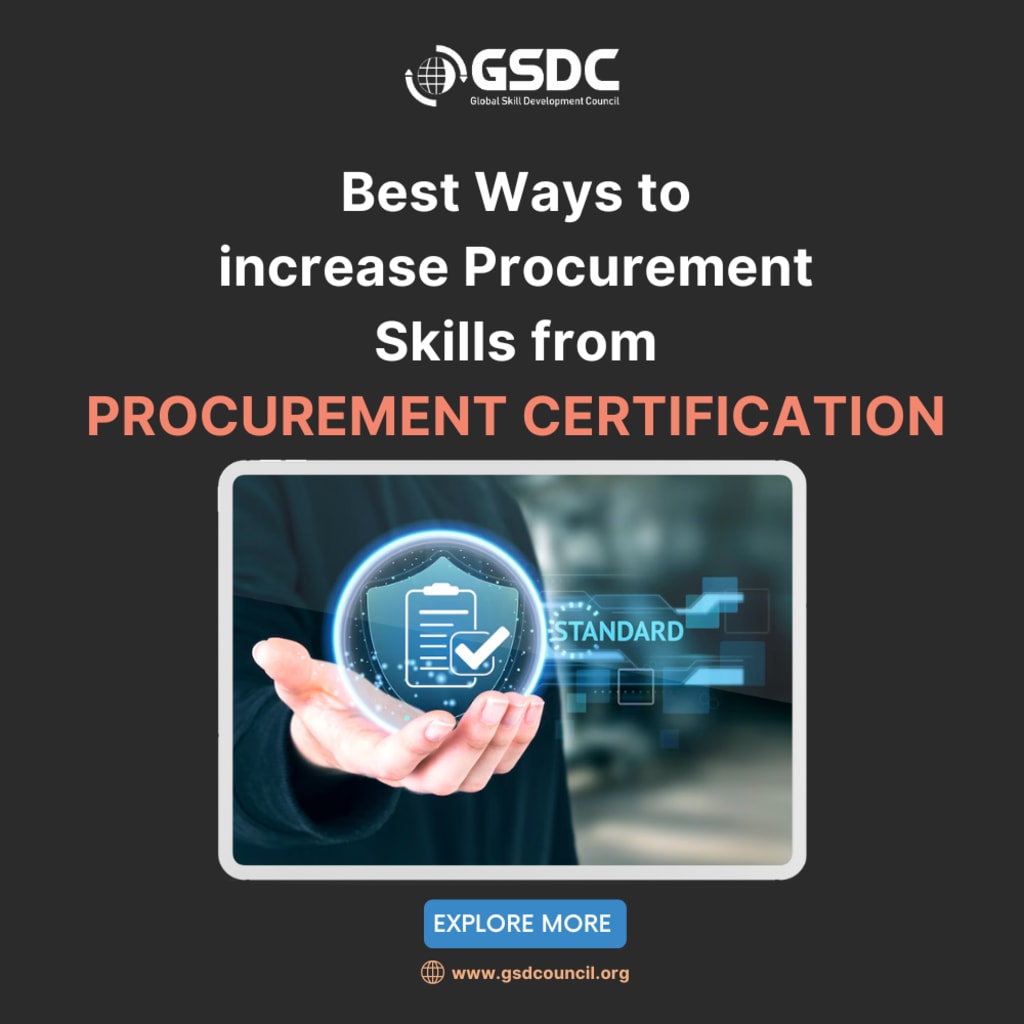Best Ways to increase Procurement Skills from Procurement Certification
Obtaining certification as a Procurement Professional can open doors to various career opportunities within the procurement and supply chain management field.

Procurement Certification serves as a valuable credential for individuals seeking to advance their careers in procurement and supply chain management. It validates their expertise, enhances their marketability, and opens doors to diverse career opportunities and leadership roles within the field. procurement certification is a valuable credential for professionals seeking to establish themselves as experts in the field of procurement and supply chain management, and it serves as a testament to their commitment to excellence and continuous professional development.
Increasing procurement skills through procurement certification involves a multifaceted approach that combines formal education, practical experience, and ongoing professional development.
Here's an explanation of the best ways to enhance procurement skills through certification:
Formal Education and Training:
Enroll in procurement certification programs offered by reputable organizations or professional associations. These programs provide structured training, covering essential topics such as strategic sourcing, contract management, supplier relationship management, and ethical procurement practices.
Participate in formal education programs, such as undergraduate or graduate degrees in fields related to procurement, supply chain management, or business administration. These programs offer in-depth knowledge and foundational skills that complement certification training.
Hands-on Experience:
Gain practical experience through internships, entry-level positions, or projects within procurement departments. Hands-on experience allows you to apply theoretical knowledge gained from certification programs in real-world procurement scenarios, enhancing your skills and confidence.
Seek opportunities to work on cross-functional projects or collaborate with stakeholders from other departments, such as finance, operations, and marketing. This exposure broadens your perspective and strengthens your ability to manage complex procurement challenges.
Continuous Learning and Professional Development:
Engage in continuous learning and professional development activities to stay updated on industry trends, best practices, and emerging technologies. Attend workshops, seminars, webinars, and conferences focused on procurement and supply chain management topics.
Join professional associations, networking groups, or online communities for procurement professionals. These forums provide opportunities to exchange knowledge, share insights, and learn from industry peers and experts.
Specialized Training and Certifications:
Pursue specialized training and certifications in specific areas of procurement that align with your career goals and interests. For example, certifications in contract management, sustainable procurement, or risk management offer deeper insights into specialized aspects of procurement practice.
Consider advanced certifications or credentials that demonstrate expertise in niche areas of procurement, such as global sourcing, public procurement, or supplier diversity. These credentials enhance your credibility and marketability as a procurement professional.
Mentorship and Coaching:
Seek mentorship and coaching from experienced procurement professionals who can provide guidance, advice, and support as you navigate your career path. Mentors offer valuable insights, share practical wisdom, and help you develop critical skills for success in procurement.
Actively participate in mentorship programs offered by professional associations, academic institutions, or industry organizations. Alternatively, establish informal mentorship relationships with colleagues or industry contacts who can offer mentorship on an ongoing basis.
Practical Application and Reflection:
Apply your procurement skills in real-world settings and reflect on your experiences to identify areas for improvement and growth. Actively seek feedback from supervisors, peers, and stakeholders to assess your performance and identify opportunities for skill development.
Keep a journal or portfolio to document your procurement experiences, accomplishments, challenges, and lessons learned. Regularly review and reflect on your experiences to track your progress and set goals for continuous improvement.
By combining these strategies, procurement professionals can maximize the value of procurement certification and continuously enhance their skills, knowledge, and expertise to excel in their roles and drive value for their organizations.
About the Creator
Enjoyed the story? Support the Creator.
Subscribe for free to receive all their stories in your feed. You could also pledge your support or give them a one-off tip, letting them know you appreciate their work.





Comments
There are no comments for this story
Be the first to respond and start the conversation.